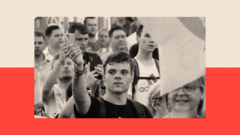In a quaint bar in Freiberg, a town historically tied to mining, 19-year-old Nick shares his frustrations about the political climate in Germany, expressing a longing for safety and security. The sentiment he conveys resonates with many young men in the country, leading to a burgeoning interest in the far-right Alternative für Deutschland (AfD). Recent polling suggests the AfD's popularity has risen significantly, particularly among young men, attributing their support to increasing anxiety over immigration and societal changes.
Nick's apprehensions, echoed by his friend Dominic, stem from high-profile crimes allegedly committed by asylum seekers, prompting youths to re-evaluate their positions on immigration. Dominic articulates a nuanced view, asserting he welcomes those who integrate but expresses dismay over perceived exploitation of the asylum system, a sentiment he fears will label him as extremist. Their endorsement of the AfD, historically criticized for its anti-immigrant rhetoric, indicates a clustering of young men around a movement that promises a return to traditional values in times of uncertainty.
Pew research highlights that 26% of German men view the AfD positively, contrasting with only 11% of women. This trend reflects a troubling generational divide, as conservative issues increasingly resonate with young males seeking representation. The AfD’s embrace of social media, particularly platforms like TikTok, exemplifies a modern approach to political engagement, allowing them to amplify their messages while circumventing traditional media narratives deemed hostile.
Influencers on platforms such as TikTok actively promote AfD principles amidst broader discussions on gender roles and immigration, igniting a counter-movement against perceived ‘gender ideology’. TikTok, essential for the AfD's reach among younger demographics, has allowed the party to reshape its public image and disseminate its ideals widely.
As historical lessons of Nazi Germany become more obscured, normalization of far-right rhetoric appears unsettlingly achievable among youth. Conversations surrounding controversial figures within the AfD demonstrate a cavalier attitude towards historical accountability, raising alarm about the ideological undercurrents shaping the next generation of German leadership and citizenship.
Educators like Diana Schwitalla are increasingly confronting troubling sentiments among their students, with instances of Holocaust denial and nostalgia for a distorted vision of national pride emerging in classrooms. The disconnect observed in political preferences among young people hints at deeper anxieties about culture, identity, and societal values.
With the AfD capitalizing on public unease regarding immigration and crime, their platform's appeal has morphed into a coherent ideology that resonates with disenfranchised youths. Discontent with mainstream parties sets the stage for a profound reshaping of Germany’s political landscape, rendering the echoes of the past all the more relevant. The AfD's consolidation of its position signals not just rising support but also challenges to social cohesion in a nation striving to grapple with its history while navigating contemporary issues.





















